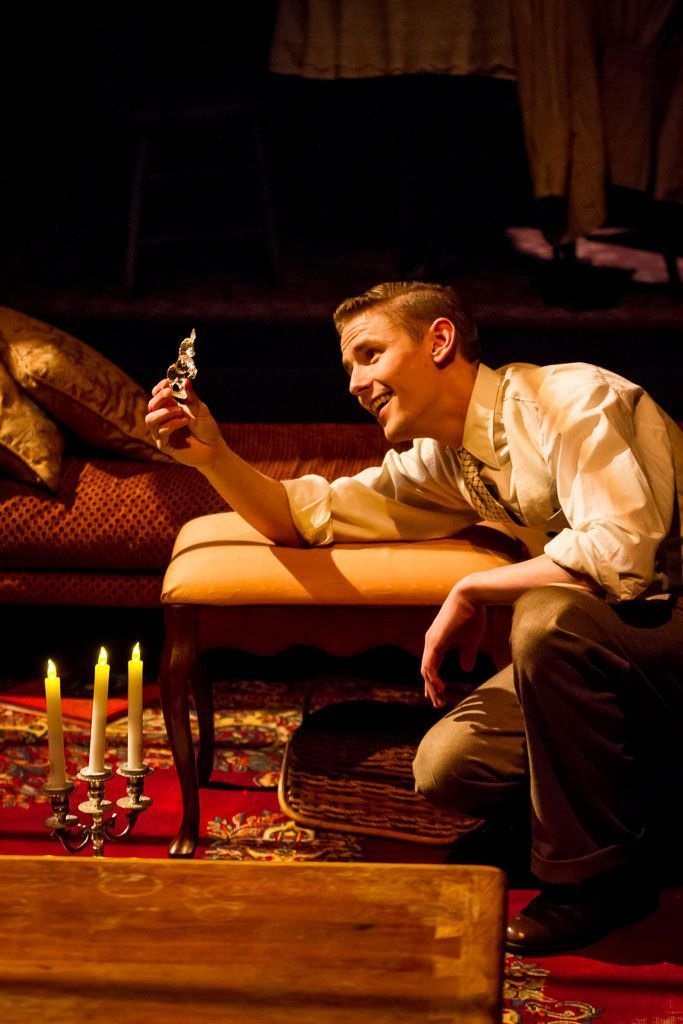
Credit: Mark Halliday
At the Jericho Arts Centre until December 21, 2014
1-800-838-3006/brownpapertickets.com
Posted December 11, 2014
Nowhere in the Tennessee Williams’ canon are there more obvious autobiographical elements than in The Glass Menagerie: the narrator/protagonist in this memory play is Tom, Williams’ actual Christian name. Like Tom’s mother Amanda in the play, Williams’ mother was a faded southern belle whose marriage was a terrible disappointment. Williams had an emotionally fragile sister Rose who was eventually diagnosed as schizophrenic; in the play, Laura, the sister, is pathologically shy, has a limp and was called “Blue Roses” by a boy she fancied – but was far too shy to talk to – in school.
Obviously close to Williams’ heart, The Glass Menagerie took him from obscurity to celebrity. He went on to write A Streetcar Named Desire, Cat On a Hot Tin Roof, Night of the Iguana, Sweet Bird of Youth and many more. Through the 1940s, 50s and into the early 60s, his name was synonymous with American Drama. Then there was a slow decline until his death in 1983 at the age of seventy-one.
In the play, Tom looks back on a period in his life that fills him with regret: like his father – a telephone man who, according to Tom’s mother – “fell in love with long distance”, he eventually abandoned mother and sister when he quit his much-hated shoe warehouse job and left home.

Credit: Mark Halliday
Shawn Macdonald directs what he refers to as a “delicate” play, as delicate as the tiny glass animals that Laura collects and with which she is completely, childishly absorbed. A lovely, delicate touch is the inclusion of violinist Masae Day who wanders in and around Craig Alfredson’s set. Kyla Gardiner’s lighting design is soft and sepia-coloured. It all feels very 30s or early 40s; it’s the past.
If the role of Amanda Wingfield is not one that mature actresses fight for, it should be. Perhaps it’s not as nuanced and enigmatic as, say, Hedda Gabler, but the range is challenging: protective, nagging, nervous, angry, overbearing, flirtatious, hopeful, despairing. Marilyn Norry embraces it all whether in a dowdy housedress and kerchief or an ivory-coloured chiffon and lace gown, kept in a trunk since Amanda’s girlhood when she was pursued by seventeen “gentlemen callers.”
Tragically shy Laura has, of course, none of those. Director Macdonald chooses to emphasize both Laura’s emotional instability and her limp. Christine Quintana’s Laura is so obviously broken in mind and body that it alters the balance of the play: Amanda and Tom live sufficiently in the real world to know that finding a husband for this particular Laura is never going to happen. And Tom would never risk bringing a co-worker home to meet this childlike, pathetic Laura; the idea is ridiculous. There must be some tiny, tiny sliver of hope for Laura in the scene with Jim (Graeme McComb).
In this Fire Escape Equity Co-op production, McComb’s Jim seems – if only briefly – genuinely, but unbelievably, romantically interested in Laura; there’s a kiss and it’s not a just a brotherly peck on the cheek. But Jim is far too confident, far too forward-looking to consider, even for a moment, a lifetime with this glass figurine, this Laura.

Credit: Mark Halliday
Scott Button is Tom and he makes a good case for Tom, trapped in a hateful job and tied to his mother and sister. While Button’s performance makes us sympathetic to Tom, the fact that he leaves his mother and sister literally in the dark (after taking the money for the electricity bill and spending it on a merchant marine’s ticket so he can sail away) ultimately disappoints us.
Regret is the colour of this play.
The Song Is Ended (But The Melody Lingers On) is the perfectly chosen song to take us back in time and into the heart of Tennessee Williams who redeemed himself by giving half the substantial royalties from this play to his mother and who financially supported his sister Rose in the institution where she spent the last years of her life.
I met Tennessee Williams in the late 70s when he came to Vancouver. The Playhouse had agreed to mount The Red Devil Battery Sign and he had agreed to sit in on some of our UBC classes. I was overwhelmed to be in the same room with him and was, as I recall, speechless in his white linen-suited, panama-hatted presence.

Credit: Mark Halliday

